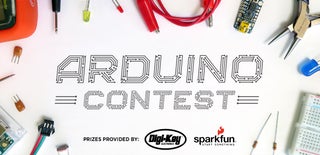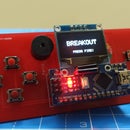Introduction: How to Make Simple Weather Station Using Arduino
Hello Guys, In this Instructable I will explain how to make simple weather station to sense temperature and humidity using DHT11 sensor and Arduino, the sensed data will be displayed on LCD Display. Before starting this instructable you must know some information about the DHT11 sensor.
For more information visit Electronics Projects Hub
Lets Gets started....
Step 1: Parts Required
Step 2: About DHT11 Sensor
DHT11 is a humidity and temperature sensor. It can be used as humidity sensor as well as the temperature sensor. You can find the dht11 sensor of 2 types in the market. One is with 4 pins and another is with 3 pins. In 3 pin dht11 sensor already 10k Ohm resistor is added inside the module. The operating voltage of this module is 3.3 V. The output of this sensor is digital.
Step 3: Connecting DHT11 With Arduino
If you are using 4 pins DHT11 Connection are as follows
DHT11 Arduino UNO Vcc 3.3V Out PIN4 (Digital) GND GND NC --Connect a 10K Ohm resistor between Vcc and Out Pin of DHT11.
If you are using 3 pins DHT11 Connection are as follows
DHT11 Arduino UNO Vcc 3.3V Out PIN4 (Digital) GND GNDStep 4: Connecting I2C LCD Display to Arduino
I already made an instructable on how to connect I2C LCD display to Arduino
You can check here https://www.instructables.com/id/How-to-Connect-I2...
I2C LCD Arduino
GND <---> GND
VCC <---> 5V
SDA <---> A4
SCL <---> A5
Step 5: Code
You must include dht11 and I2C LCD libraries. You can download below.
#include <dht.h>
#include <Wire.h>
#include <LiquidCrystal_I2C.h>
LiquidCrystal_I2C lcd(0x27, 2, 1, 0, 4, 5, 6, 7, 3, POSITIVE);
dht DHT; #define DHT11_PIN 4
void setup(){
lcd.begin(16, 2); }
void loop() {
int d = DHT.read11(DHT11_PIN);
lcd.setCursor(0,0);
lcd.print("Temp: ");
lcd.print(DHT.temperature);
lcd.print((char)223);
lcd.print("C");
lcd.setCursor(0,1);
lcd.print("Humidity: ");
lcd.print(DHT.humidity);
lcd.print("%");
delay(1000);
}
Step 6: Complete Construction and Working
If you want to learn C Programming you can easily learn at codingtute. It will enhance your arduino programming skills.
Don't forget to subscribe my YouTube Channel
Visit my website Electronics Projects Hub

Participated in the
Arduino Contest 2017













